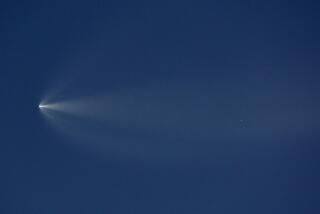Critics Shoot Down V-2 Rocket Ceremony : Germany: The observance was to mark the dawn of the space age 50 years ago. But Nazi-era remembrances prove too strong.
- Share via
BERLIN — How long before Germany emerges from the shadow of its Nazi past? A long time still, a stunned German aerospace industry learned Monday.
Reacting to a wave of international protest and some severe domestic criticism, the industry’s main group, the German Aerospace and Weapons Industry Assn., canceled a planned Saturday celebration of the 50th anniversary of the first successful V-2 rocket launch at the Peenemunde range on the north German coast.
The event “to commemorate . . . the birth of space travel will not take place,” declared a terse statement from the group’s president, Karl J. Dersch. He had lined up dignitaries, including Economic Ministry State Secretary Erich Riedl, to commemorate the launch of the 5 1/2-ton rocket fired from Peenemunde on Oct. 3, 1942, under the direction of a young scientist named Werner von Braun.
The V-2 soared to a height of more than 50 miles that day, and as a result, the date is generally recognized as the birth of the space age.
Von Braun later became a key figure in the American space program, and other Peenemunde scientists formed the heart of the U.S. and Soviet missile and space development efforts that placed the first men in space and on the moon.
But the V-2 was also the creation of Nazi leader Adolf Hitler, who financed its development and two years later launched it against Britain and the Low Countries in attacks that claimed 2,000 lives and terrorized civilians during World War II’s final months.
Far worse, the V-2s were produced using Nazi concentration camp victims as slave laborers, who worked under horrific conditions on assembly lines built in damp, cold underground caverns to protect the project from allied bombing raids. Of the estimated 60,000 workers forced to make Hitler’s V-2s, it is believed that more than 20,000 never survived their ordeal.
Several German scientists reportedly expressed reservations earlier this month when told of the planned celebrations, but the first real public protest came from London late last week.
In a radio interview Saturday, Winston Churchill, a Conservative member of Parliament and grandson of Britain’s great wartime prime minister of the same name, declared himself “filled with disbelief that the Germans should wish to mount such a celebration.”
By early Monday, the planned celebration began to crumble. Riedl, who had dismissed British criticism and defended his planned appearance in Peenemunde, quickly reversed field after his minister, Economics Minister Juergen Moellemann, labeled the event “tasteless.”
By noon, Chancellor Helmut Kohl let it be known he had not been informed of the celebration, which coincides with the second anniversary of unification. His spokesman called it an “unwise arrangement,” and those trying to raise money to build a memorial to the slave laborers who died building the V-2s expressed outrage at the idea.
By midafternoon, organizers issued a brief statement canceling the event.
More to Read
Sign up for Essential California
The most important California stories and recommendations in your inbox every morning.
You may occasionally receive promotional content from the Los Angeles Times.













